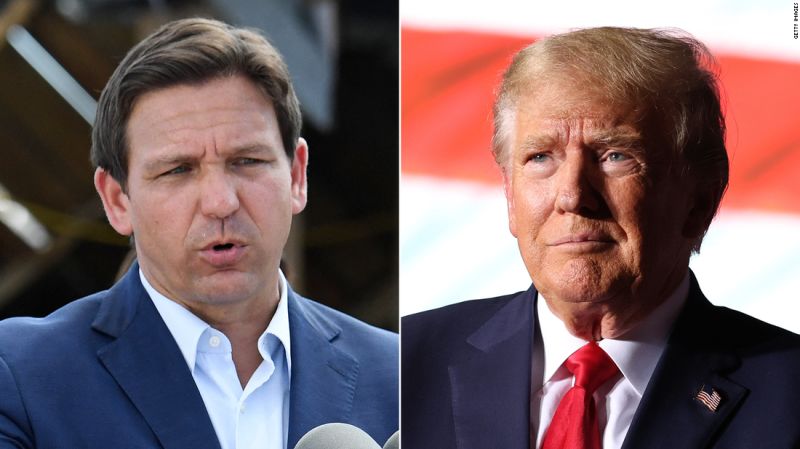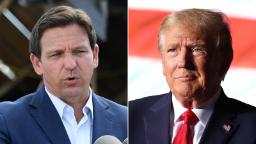

A version of this story appeared in CNN’s What Matters newsletter. To get it in your inbox, sign up for free here.
CNN
—
The 2024 Republican presidential primary is not fully underway as yet and already we are in the food fight phase.
A super PAC supporting former President Donald Trump tried to smear Florida Gov. Ron DeSantis with pudding, seizing on a report, which the governor denies, about his eating habits to make a point about Social Security and Medicare.
The ad itself is gross. And it drew a super PAC supporting DeSantis off the sidelines to air an ad of its own wondering why Trump was going after the Florida governor.
For the record, neither DeSantis nor Trump currently say they will touch safety net benefits, but both have a past of suggesting they could.
I talked to CNN chief national affairs correspondent Jeff Zeleny by email about the Trump/DeSantis dynamic, the role of deep-pocketed super PACs and what else is going on in this nascent primary campaign.
WOLF: We are nine months away from the first primaries and not all of the top candidates have even declared their candidacies. But there’s some super PAC mudslinging. What’s happening and what do we need to take from all of this?
ZELENY: A new season of attack ads has begun, with allies of Donald Trump and Ron DeSantis firing some of the first direct shots of the young presidential campaign. Now is the time to define your opponent – whether you’re an announced candidate (Trump) or expected to be one soon (DeSantis) – and begin pointing out potential vulnerabilities. Not surprisingly, the opening volley was about Social Security and Medicare and highlighting old comments about promising to reform the entitlement programs.
WOLF: Super PACs can’t technically coordinate with campaigns. DeSantis doesn’t technically have a campaign. How is that working exactly?
ZELENY: The Florida governor isn’t planning on jumping into the presidential race until May or June – after the legislative session is over – so until then, a group of deep-pocketed allies are coming to his defense. The super PAC, which is called Never Back Down, is effectively a campaign in waiting, complete with pollsters and political strategists of all varieties. Federal election law prohibits coordinating with the campaign, but when there isn’t an official campaign, that formality becomes far easier.
WOLF: Do other Republican candidates have deep pocketed super PACs? Who are the other players to watch?
ZELENY: Not nearly as deep, no, but most major Republican candidates have at least some type of super PAC assistance. Former South Carolina Gov. Nikki Haley has some support – and is seeking more – as are other potential candidates. One likely presidential contender, Sen. Tim Scott, has one financial advantage that makes him stand apart from his rivals: He has more than $20 million left over in his campaign account from last year’s Senate race, which he can use on his presidential race. That’s a head start most of his rivals can only dream of.
WOLF: Trump and DeSantis have been shadowboxing around each other for some time. Can we assume this is a prelude to a much more bruising fight in the making? What does this say about GOP unity heading into the primaries?
Zeleny: GOP unity? That will come later – or that’s the hope of top Republican officials – but the bruising season of define-your-opponent is underway. The Trump-DeSantis feud has long been simmering, but their springtime exchanges are almost certainly quaint, compared to what’s likely to come.
WOLF: What do we know about where these super PAC ads are running? Are they focused on specific types of voters or is this simply an effort to get attention from us in the media?
ZELENY: For now, most of the ads are running on cable television and sports. The Make America Great Again group, which supports Trump, has been running ads for weeks now seeking to define DeSantis in a negative light. You have likely seen some of these, which begin with the ominous: “Think you know Ron DeSantis? Think again.”
WOLF: Are there any changes in how you think super PACs will operate this year and how they’ll be involved in the campaign?
ZELENY: With every passing election cycle, super PACs play a more prominent role. It’s easier to raise money – without the federal limits imposed upon candidates. If the early months of the year are any indication, the 2024 campaign will push the limits even more, with outside groups far more important than political parties or, in some cases, even the candidates themselves.
WOLF: Are there any early conclusions we can draw about how Trump’s indictment by the Manhattan DA on criminal charges has affected his campaign? Has it impacted his popularity among Republican voters? Affected his fundraising?
ZELENY: Early conclusions are often risky ones, but the Trump campaign insists the indictment has been a fundraising boost. It certainly has rallied many Republicans around him – or at least unified them in opposition to the indictment – but it may be far too soon to say whether this will continue to be the case. He faces potential criminal action in Georgia, for his role in trying to overturn the election results, as well as at least two federal investigations.
